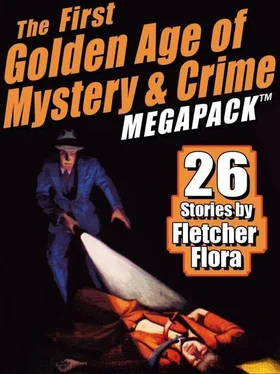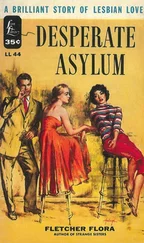The chief looked at her blankly, wondering if his hearing, like his sight, was becoming impaired.
“I’m sorry, Mrs. Moran,” he said. “I don’t believe I heard you correctly. Would you mind repeating that?”
“My husband,” she repeated deliberately, “intends to murder me.”
Crazy, he thought. Crazy as all hell. Hadn’t her mother had trouble that way? He seemed to remember that she had. Anyhow, what do you do with a crazy woman when she walks into your office and throws a bomb into your lap? Well, in the first place, you understand that the bomb is a dud.
Don’t get excited. In the second place, you humor her. You play along. In the third place, after you’ve got rid of her, you protect your pension by reporting to her husband. From there on, it’s his baby, and welcome to it he is!
“That’s a startling accusation, Mrs. Moran,” he said.
“It’s true.”
“It seems incredible. Your husband is a very prominent man. One of the most respected citizens of this community.”
“I know how he’s regarded. I’m telling you what he is. ”
“No breath of scandal has ever touched his name.”
“He’s very clever.”
“Well, let’s look at this thing objectively. Without emotion.”
“It is somewhat difficult to be unemotional about your own murder.”
“Yes. I understand that. Tell me exactly what makes you think your husband plans to murder you.”
“The way he looks at me. The things he says to me when we’re alone.”
“Oh, come, Mrs. Moran. That’s tenuous evidence at best.”
“You don’t understand my husband. You don’t know him. He’s clever and cruel. It gives him pleasure to taunt me. He likes to terrify me and watch me suffer.”
“Has he ever threatened directly to kill you?”
“He is much too devious and subtle for that.”
“Even if he had, it wouldn’t necessarily mean much. I’ve been married for forty years, Mrs. Moran. Hard to tell how many times I’ve threatened to brain my wife. Maybe, sometimes, I’ve even felt like doing it. But I never have, and I never will.”
“That’s different. You are not my husband. If something isn’t done to save me, he will surely murder me.”
“Has he ever made any attempt to murder you?”
“There will be no attempts. There will only be, if he is not prevented, the accomplished murder.”
“Until he makes an attempt on your life, or at least commits a chargeable offense against your person, I don’t see how the police can help you.”
“It will be too late for help then. His first attempt will be successful.”
“Surely you understand that we can take no action on so grave a charge as this when there is nothing to support it but questionable interpretations of words, gestures, looks. An assumption of intent without proof.”
“I see. I see that you won’t help me.”
The dull despair in her voice, hopeless submission to what he was convinced was an imaginary danger, pricked his leathery heart for a moment and incited a rare flicker of genuine pity. She was hot, this one. She had smoke and flame coming out her ears. She needed help, all right, but not the kind of help the police could give.
“Look at it this way, Mrs. Moran,” he said. “What reason could your husband possibly have for murdering you? You are a beautiful woman. I’m sure you are a faithful wife. You and your husband have been married for how long? Two years? The honeymoon is hardly over yet. There is no reason at all to believe that he has the slightest interest in another woman, is there? I thought not. If he did have, seeing you, I’d have to say he was nuts. You see what I mean? There’s no motive for him to murder you.”
“He wants to murder me because he hates me.”
“Oh, please. Frankly, I find that impossible to believe,” he argued.
“He hates all women. Especially the women he marries. I can’t explain it. It’s something inside him, something sick, insane. You’ll believe me when it’s too late. He will murder me, just as he murdered his first wife.”
“What? What’s that?”
“His first wife. He murdered her.”
“Stop it, Mrs. Moran! His first wife drowned. It was an accident. As an accident, it had to be investigated, of course. Your husband and his first wife were out on the lake west of town. They were in a motorboat, fishing. Your husband is a dedicated fisherman, as you must know. The first Mrs. Moran was not, although she apparently made an effort to share your husband’s enthusiasm. It was late in the evening of this particular day, almost dark. According to testimony, they were about to come back to shore. Mrs. Moran was wearing her swimming suit, and she decided, before coming back, that she would take a dip in the lake. She went over the side of the boat. It was the end of a hot day, and the water there was deep and cold. She took a cramp and drowned. She was quite a distance from the boat. Your husband tried to save her, but he couldn’t reach her in time. She drowned, that’s all. She just accidentally drowned.”
“Are you so sure?”
“I’ve just told you what happened.”
“Did anyone see the accident?”
“No.”
“You had to depend on my husband’s version.”
“There was no reason to doubt it.”
“On the other hand, there was no way to verify it.”
“He was heartbroken. His grief was genuine. Anyone who saw him could tell.”
“Clay is very clever.”
“He had no reason to murder her, no more to murder her than to murder you. There was absolutely no evidence that he murdered her. All the evidence, circumstances and possible motivation and method, all considered together, pointed clearly to an accident.”
“He killed her because he hated her, as he hates me.” She stood up abruptly, clutching her purse with both hands in front of her. Her face in defeat was composed, touched by sadness and despair. “You will remember what I have told you when I’m dead.”
The door had hardly closed behind her before he was reaching for the telephone on his desk.
Outside, she stood with her head bowed, crushed by the monstrous burden of her hopelessness. She had neither the strength to run nor the cleverness to hide. In any event, even if she had the strength and cleverness, running and hiding were clearly impossible. Clay was too rich. His power reached too far. Wherever she went, he would find her. Whatever she did, he would kill her. No one would believe her. No one on earth would help her.
Then, for the second time on the second day after not thinking of him at all for a long while, she thought of Roger.
She listened to the ringing of the telephone at the other end of the line. In her ears, the ringing was converted by the wire into a series of angry, waspish sounds. She counted the sequence of sounds, one, two, three, four, five. After the fifth, she hung up the receiver and stepped out of the telephone booth in the drugstore where she had gone to call. She stood for a minute outside the booth with her head bowed, as if she was trying intensely to remember something that she had forgotten. She had now reached, in fact, the nadir of her despair. Roger was not at home. Even if he had been at home, she conceded dumbly, there was no good reason why he should want to talk with her or see her or lift a hand to help her. Even if he were willing to help her, which he probably would not be, there was surely nothing that he could do. There was nothing anyone could do, and there was nothing now to be done. Nothing to do and nowhere to go. Nothing and nowhere on earth.
Yet it was necessary, absolutely necessary, to go somewhere and do something. One simply could not, after all, stand forever motionless outside a phone booth in a drugstore. At the rear of the store, across from the booth, there was a lunch counter with a row of unoccupied stools in front of it and a girl in a starched white dress behind it. As a beginning, the lunch counter would be a place to go, and drinking a cup of coffee would be a thing to do. Having made this decision, or having had it thrust upon her by circumstances, she walked across to the counter, sat down on one of the stools and ordered the cup of coffee from the girl in the starched white dress.
Читать дальше












